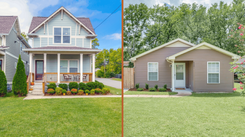38 Questions to Ask BEFORE Buying a New Construction Home


by Tyler Forte
So you’re going into the new home building process blind (especially if it’s your first time!). It doesn’t have to stay this way. Once you surround yourself with a quality Realtor, builder, and lender, then it’s just a matter of asking the right questions. At Felix, we've rounded up an extensive list of questions to get your discussions rolling with these professionals. We believe that all homebuyers should equip themselves with the proper knowledge so they can find the best new construction possible. Read on to find out more.
Questions To Ask Yourself
You should consider what you want when you tour model homes. The key is sticking to your goals and preferences to avoid getting distracted by beautiful model houses.
What type of home should I buy?
Consider your lifestyle and family size. Do you need a lot of space? Will you benefit from a large yard? Are you willing to do more home maintenance? Often people think they want a large house, only to find that they hate paying for or doing the upkeep. Think about how you spend your downtime. Some people take pride in maintaining a home, and others hate the time suck.
What area of town should I live in?
Location is everything. Often you are sacrificing house size to be closer to town or in a desirable neighborhood. So you should think about the area of town you prefer alongside questions about types of homes. Is it essential to be out of your house in a good area of town, or are you a homebody? If you have children (or want children), you will need to think about schools and recreational spaces, like parks. What will your commute be like?
Do I want to live in a community with an HOA?
Most new construction homes are in planned communities. These newer planned communities come with HOAs or homeowners associations. There are pros and cons to being a part of an HOA.
- Advantages: HOAs ensure that everyone maintains a consistent level of maintenance and follows guidelines. The goal of this is to maintain property values for the whole community.
- Disadvantages: HOAs can feel constricting to some people. Often there are difficult approval processes for simple upgrades to homes. People often think that HOAs are watching or judging them.
Different personalities love or hate HOAs at the end of the day. Be sure to talk with your Realtor about your preference so you can narrow down which community to select.
Which features are most important to me?
There are many ways to upgrade a new construction home, and the additions can add up quickly to your base price. Don’t get caught in the financial trap of having too many builder upgrades that you can’t afford. Instead, think about what features make the most sense for your family. Do you cook all the time? Focus your upgrade budget on the kitchen and countertops. Do your kids need room to play? Deck out your backyard. You probably can’t have it all, so it makes sense to understand your priorities before you step foot in a design meeting.
Your Realtor can also help you navigate this process. An experienced Realtor can help buyers decide which upgrades to choose and which provide a return on investment. In addition, a Realtor may advise that certain upgrades such as window blinds or sprinkler systems be done after you close on the home since builders typically charge a premium for these upgrades.
What is my budget?
You should work backward to create your budget. How much can you afford to pay in mortgage payments each month? From there, you can see what type of financing you can get. This should give you a clearer view of your bottom line price. You will also need to consider a down payment as well.
Should I hire a Realtor?

You may wonder if a Realtor is even necessary. You visited a few model homes, and the builder’s agent said they could represent you as well. So what’s the point of going through the trouble of hiring your own realtor?
The point of a Realtor is to have representation that advocates for your best interest. So, we recommend having your own Realtor for any real estate transaction. It may feel redundant, but it’s the best way to make sure you cover your bases. Plus, if you use Felix as your buyer's agent, you could get up to 1% off the sales price!
Questions To Ask A Realtor
If you’re ready to take the plunge into house hunting, you’re going to need someone who is on your side. Here are a few questions to ask a Realtor as you navigate your home build.
Are you a Certified New Home Specialist?
There are a variety of Realtors and real estate agents out there. Make sure you choose a professional that has new build experience. Realtors can earn the designation of Certified New Home Specialist, which means they have completed additional training related to new construction homes.
Which new housing development is right for me?
Besides thinking about your lifestyle and location preferences, it’s good to discuss with your Realtor which housing developments are best for you. They also may be privy to new developments that aren’t on your radar.
Do I have to use the builder’s sales contract?
Most builders will require you to use their builder’s sales contract. But if you use a Realtor, you often can negotiate aspects of the contract such as a reduction in closing costs and additional builders upgrades at no cost.
Are there any red flags in the builder’s sales contract?

It depends on the builder’s sales contract. But here are a few issues that can come up.
- The amount of the builder deposit and when it is due
- Whether or not the builder deposit is refundable, and what conditions you can get a refund
- Your ability to back out of the transaction
- Build time listed in the contract can be very high to protect the builder
- Contingency clauses for appraisals can favor the builder
- Lack of flexibility for changes
It’s crucial to have your Realtor look over the builder’s sales contract because they are all different.
What are some common mistakes or pitfalls I should avoid when buying new construction?
Many common mistakes come up when buying a new construction house. You can prevent most with careful vetting of the builder and builder’s sales contract. Some of the issues include:
- Construction lacks quality and requires a lot of repairs
- Builder does not perform tasks that were part of the scope of work
- Picking the wrong upgrades
- Construction is taking longer than expected
- Overlooking issues found in the home inspection
Which features are most important for resale value?
Put your money in big-ticket items that can be pricey or difficult to upgrade after you close. This includes energy-efficient windows, the kitchen, additional square footage, and flooring.
Can I back out of my sales contract before closing?
That depends on your home purchase contract and what contingencies are in it. This discussion needs to occur before you sign a builder’s sales contract. Typical contingencies that should be in your agreement are:
- Buyer’s inspection contingency
- Financing contingency
- Homeowners’ insurance contingency
- Appraisal contingency
- Sale of house contingency
A Realtor will know which contingencies are reasonable for the market you’re in and make sure your contract has as many safeguards as possible.
What should I look for during the new construction walkthrough?

You should have an independent home inspector look at your home before closing. But there are a few different home inspections before the final inspection rolls around. A Realtor can be helpful during a final walk-thru like the blue tape inspection.
Questions To Ask The Builder
Asking the right questions to the builder is the key to setting up the right deal for a new construction house. These questions can help you pick the right builder and make sure your expectations are aligned which makes for a smoother build process.
Can I see houses and subdivisions that you have already built?
You should be able to see houses and subdivisions that were built by your builder. Your builder should be able to offer many examples of their experiences. Taking a drive through their established neighborhoods is an invaluable experience. You can see how their houses have aged. It also shows you what a house looks like beyond the perfect model home.
Can I see references from customers?
Your prospective builder should be able to provide references and testimonials from authentic and recent buyers. But you should go beyond this.
As you drive through communities and subdivisions that your builder constructed, don’t be afraid to talk to neighbors there. Often on weekends, you can find people working in their yard or walking around the neighborhood. Ask these residents if they are happy with their builder. Most people are glad to do this, and people love to talk about their homes.
If there are problems with the builder, ask about what the builder did to fix these issues.
Do you have a model home that I can tour?

Model homes will show you an example of your builder’s work. But be aware that a lot of things in the model home will not come standard. It can still help you get a sense of the builder by visiting a model home and seeing what upgrades are possible.
What type of amenities comes in the new construction community?
If you’re early to a subdivision, be sure to get the rundown of community amenities. Will there be a pool? A golf course? Hiking trails? Are there additional costs to use these, or do your HOA fees cover these things?
Amenities can add to your property value. It’s good to know these things if you’re trying to narrow down several communities on your list.
What is considered standard, and what is an upgrade?
Some builders give you more than others. Be sure to ask about upgrades and ask for a detailed list explaining upgrade costs. A Certified New Home Specialist can help you compare upgrades between builders. Some builders may have a larger starting price, but you may not have to get as many upgrades. It’s worth doing your homework here because upgrades can drastically change the final cost of your house.
Are there any incentives to use the builder’s preferred lender?
Often builders offer very little negotiating room on price, but they do provide other incentives. For example, you can use a builder’s preferred lender for certain benefits. Some examples of these incentives include money off closing costs or upgrades.
Do the math on these incentives. Sometimes the builder’s preferred lender offers comparable rates, and the extra incentives make them worth it. Other times the additional incentives do not add up enough to be a real benefit. Always shop around for financing.
What kind of lot should I get?
There’s a lot to think about when selecting a lot. Which direction will your house face? This will affect how the sunlight hits your home. This can affect natural light, gardening, and energy efficiency. The slope of the lot can also change which house plans you can use. Builders can only implement certain floor plans on certain lots.
Location is everything. A builder should have access to the more extensive plans of the development. Are you located in a lot that is near amenities, a busy road, or privacy? What will be built near you in the future? The answers to these questions can affect your future property value.
Is the lot cost included, and is there a lot premium?
If you’re building a spec house in a subdivision, chances are the lot cost is included. But if you’re building a completely custom home, then that might not be the case. Ask the builder if they include the lot cost in the final price.
In many subdivisions, some lots are considered better than others. These come at a premium price. Ask if your prospective lot has a lot premium fee.
When do I owe money?
Most builders ask for a deposit when signing the purchase agreement. This amount will get rolled into your down payment later.
Then you typically owe money for upgrades. Builders want to be able to get money back if the deal falls through, and they can lose money on upgrades if they sell your house to another person. Some builders will ask for you to pay for the upgrades in cash, but other builders allow you to roll it into your financing.
Finally, you will pay your down payment at closing.
Who supervises the construction of my home?

Typically a superintendent or construction manager will supervise the construction of your home. They will manage subcontractors, management, deliveries, and general operations of the building site. It depends on the building company and how often you see this person.
Who will be my point of contact during the build?
With all of the money you are investing into your brand new home, it’s essential to know that you have someone to talk to when you have concerns. Is it best to contact the construction manager or someone else when you have a question or concern? Is there a phone number I can have so I can reach them directly?
What will the schedule be like?
The timeline is a big worry when building a new construction house. The reason for this is many homebuyers count on the sale of their previous home to finance their new home. They, however, do not want to sell their previous home too quickly and have to figure out temporary housing.
Most new construction homes take 6-9 months to build. But that’s a big range when you’re trying to pinpoint a completion date. Your builder should be used to your area’s weather, permitting, and labor conditions. So they might not be able to give you an exact date, but they should still be able to provide a reasonable estimate.
How often do you finish houses on time?
This question goes back to gathering reviews and testimonials. But it’s fair to ask your builder how often their estimates are accurate.
What happens when there is a delay?
There’s a lot that can delay new home construction. That’s because there are a lot of interconnected parts to home construction that many people are involved with doing. So your home can get delayed, and it might not be the builder’s fault.
Some common delays are:
- Labor shortages
- Weather
- Material delays
- Errors
- Last-minute changes
It should be clear from your sales contract what to do if there is a construction delay. The contract should define excusable and inexcusable delays. Have your Realtor review this aspect of the contract.
Will the price of my house change if the cost of materials or labor goes up?
With inflation, the cost of materials and labor is bound to go up while building your house. What is your builder going to do about this? Ask your builder if they have a cost escalation clause. This means the builder can raise their prices if costs go up. It works better for the buyer if the price stays the same, so be careful of this fine print.
What materials will be energy-efficient?

One of the benefits of buying a brand new house is how energy-efficient these homes are compared to older ones. Ask your builder what types of materials they include as energy-efficient in the standard package. Some examples of energy-efficient items in a house are:
- Windows
- Insulation
- Appliances
- Doors
- HVAC systems
- Water heaters
Am I able to change my mind about features and upgrades? Will there be charges for this?
You’re bound to change your mind during the construction process. But at what cost?
Your builder can handle changes. But often, change orders can lead to added charges and/or delays. Make sure you get all information about this. Also, ask for a schedule for when changes can no longer happen (i.e., when is it the time you can no longer change your cabinet color?)
What type of landscaping is standard?
Get it in writing which elements of the landscaping come standard (including the driveway!). For example, many homebuyers are not aware that backyard landscaping and grass are typically not included in sales contracts. So it is always good to get clarification on this.
What is your builder’s warranty like?
All new construction homes should have a warranty. Make sure your Realtor negotiates a warranty for you. Some states require that your builder provide a one-year warranty. Typically a warranty covers significant things but is still considered limited. Here are some usual parts of a warranty:
- Ten-year warranty for structural issues
- Two-year warranty for major systems like HVAC, plumbing, or electrical
- One-year warranty for cosmetic defects such as cracks in the concrete or drywall.
Be sure also to ask what your warranty doesn’t cover.
How do we get things fixed after closing?
There are bound to be some issues after moving into your house. Who do you call if you have a problem? Does your builder have a good reputation for making repairs?
Can I hire my own independent home inspector before closing?

A good builder should welcome an independent home inspector before closing. An independent home inspector can identify significant issues before closing to prevent major headaches with the home warranty and repairs. You will want this for your final walk-through.
In most parts of the country, you can hire an independent home inspector for under $500, and this is priceless considering the peace of mind a home inspection provides before the move-in day.
Questions To Ask A Lender
You should talk to a lender at the beginning of the househunting process, and also at the end for closing. Here are some important questions to ask a mortgage lender.
What are the options I can use for financing?
There’s a lot to consider when building a house. How do I pay for the house that’s under construction while I still own my current home? Is a construction loan better for my situation compared to a traditional loan? Talking through your options can help you evaluate the pros and cons of a significant investment.
What do I do if my closing date is pushed back?
This problem comes up all the time when building a house. Mortgage lenders start the underwriting process for your loan many weeks before your closing date. Having your closing date pushed back due to construction delays can put a huge wrench in this process. Often this can change the mortgage rate you get preapproved for, and that affects your monthly payments and budget.
When should I lock in my rate?
How do you lock in your interest rate for your mortgage if you’re unsure of your exact closing date? The answer to this varies. But your loan officer can walk you through the pros and cons of paying for an extended rate lock, delaying a rate lock, and other options.
Go Into The Homebuilding Process Worry-Free With Felix
Don’t feel overwhelmed by building a new build home. With the right team on your side, you will have your dream home on your terms. All over Middle Tennessee, Felix is helping homebuyers discover the new construction home that is right for them. We provide the most comprehensive and accurate list of pre-construction and new construction homes in your area. Sign up with Felix to see exclusive properties that you won’t find on other websites.
About Felix Homes
Felix Homes is where five-star service meets low commissions! To date, we've saved our clients $1,610,738 in commission fees and have earned 120 five-star reviews on Google!
How are we able to offer five-star service AND lower commission fees? It's simple:
- We're an independently owned brokerage – not a franchise which allows us to keep more of the commission we earn.
- By offering a lower commission, more folks want to work with us which means we close more deals. By closing more deals, we can pass more savings along to our customers!
Still not convinced? Read all about our low-commission mission here.
If you have any questions about the state of the market or the home buying/selling process, please feel free to contact us at contact@felixhomes.com or 615-354-5731.





